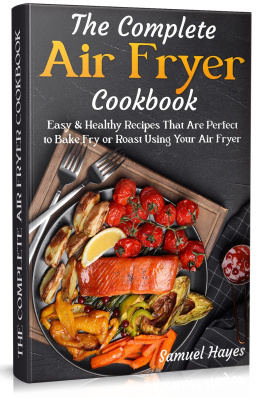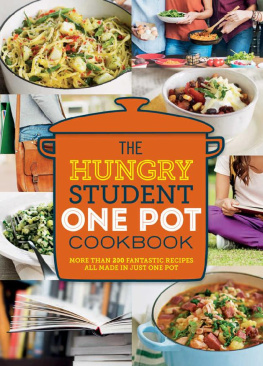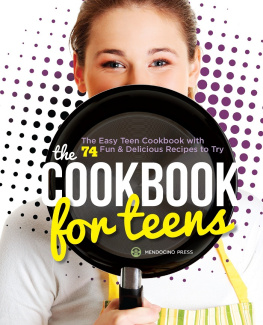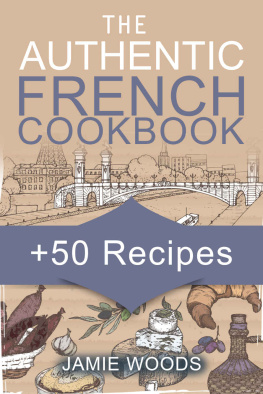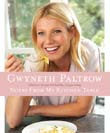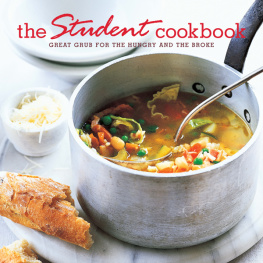

STUDENT GRUB
First published in 1991, reprinted 1992 and 1993
Second edition published in 1995
Third edition published in 2000, reprinted 2001 and 2003
Fourth edition published in 2004, reprinted 2006
Fifth edition published in 2008
This edition copyright Alastair Williams, 2013
All rights reserved.
No part of this book may be reproduced by any means, nor transmitted, nor translated into a machine language, without the written permission of the publishers.
Alastair Williams has asserted his right to be identified as the author of this work in accordance with sections 77 and 78 of the Copyright, Designs and Patents Act 1988.
Condition of Sale
This book is sold subject to the condition that it shall not, by way of trade or otherwise, be lent, re-sold, hired out or otherwise circulated in any form of binding or cover other than that in which it is published and without a similar condition including this condition being imposed on the subsequent purchaser.
Summersdale Publishers Ltd 46 West Street
Chichester
West Sussex
PO19 1RP
UK
www.summersdale.com
Printed and bound in China
e-ISBN: 978-0-85765-932-3
Substantial discounts on bulk quantities of Summersdale books are available to corporations, professional associations and other organisations. For details contact Nicky Douglas by telephone: +44 (0) 1243 756902, fax: +44 (0) 1243 786300 or email: nicky@summersdale.com.
CONTENTS
To my parents
with love and thanks
Alastair Williams was a student at numerous establishments of higher education before eventually graduating from Southampton. He has travelled throughout the world in his quest for mouth-watering recipes that can easily be reproduced by any student, and this book is the result.
INTRODUCTION
Whats all this cooking stuff about?
Starting University
Higher education is supposed to do more than improve a person academically: time spent at uni will give students an opportunity to experience a wide range of activities and to mature as an adult well, thats the theory anyway.
Starting uni in new surroundings with new people can be daunting for those leaving the comfort and security of their home for the first time it may take some getting used to. Youll have to learn to do your own washing and cleaning, and theres no longer a parents car with a full tank of petrol waiting for you when that emergency trip to A&E/the cinema/the chippy comes up. But it also means you get to enjoy a whole new level of independence and freedom from nagging parents (though we know you love them really!), and theres a host of new and exciting experiences waiting for you around every corner.
Whether you are sharing a house, living in a self-catering flat or in halls of residence, youll have to feed yourself, and though mistakes will undoubtedly be made (theres a limit to how many takeaways your stomach and your student loan can endure), with the help of this book youll find out that it can be fun finding your feet in the kitchen.
The recipes and advice in this book will enable you to discover simple but tasty dishes that should still leave you with enough money to get the drinks in afterwards. There are numerous fine cookbooks available that will tell you how to cook dishes such as pigeon breast stuffed with ceps, or how to prepare langoustine drizzled with truffle oil. If thats what youre after, you should put this book down now. The reality of university is that you will want to keep your food spend to a minimum; cooking at uni can be a challenge, but luckily you have this book to guide you on your way.
THE BASICS
What You Need
The chances are that your kitchen, as well as being a health liability, will lack the modern appliances that most family kitchens have. The idea of attempting a meal without a fancy mixer may seem daunting, but it can be done. From personal experience I know that most student kitchens will not even have a set of scales, so many of the measurements given use spoons (tablespoons, teaspoons) and grams (which you can convert into spoons see Conversion Chart).
You may also need patience. Many of the recipes given are quick and simple, but when attempting something more adventurous it is essential not to give up. There are going to be times when your souffl looks more like a pancake, but even the best chefs have the occasional disaster.
Some people will find cooking very easy, but its not everyones forte. The rest of us mere mortals need a little more perseverance and patience. Cooking disasters are all part of the fun, and experimenting with this book could lead to all sorts of wonderful experiences, some of which may even be of a culinary nature.
If you have had no experience of cooking (and judging from some of my friends who lived for three years on baked beans and toast, without the wit even to combine the two, this is entirely possible) then you will need some help. Unfortunately, most cookery books tend to contain far too many irrelevant, expensive, impractical and unpalatable recipes for students. What would your housemates think if you were to serve them a platter of marinated pigs trotters? Rest assured there are no monkey brains or goats testicles to be found in this book. Much like in a restaurant, it is the quality of food, the friendliness of the service and the general ambience that can provide a perfect meal not frilly tablecloths, crystal glasses and extortionate prices.
Common Sense
The recipes in this book are designed with simplicity in mind, both in terms of implements and cooking skills required. All that is needed is common sense. All cooking times and heats are approximate. Cooking is an instinctive thing and no number of instructions can replace common sense and initiative. Before you try any recipe, read it through first to make sure you have all the ingredients and equipment as well as the time to prepare it.
Health and Safety
If you are in a large shared house, the kitchen may have to cope with as many as seven, eight or nine people. It is quite easy when there are large numbers of people sharing a small kitchen for it to become quite disgusting. Having been a student for a number of years I have had the opportunity to visit many student kitchens, and most of them were truly revolting the washing up was normally only done when there were no more spare plates or cutlery available, or when parents or landlords came to visit.
It is a good idea if you are in a shared house to organise some sort of rota for cooking and cleaning. If one or two people cook each night for everyone it avoids the hassle that would occur if everybody in the house waited to use the cooker for themselves. It also means that you will only be cooking perhaps once or twice a week.
Once you have established that your cooking environment is clean and hygienic pay special attention to the instructions for food storage.
All perishable foodstuff will have a sell-by date printed on its packaging, and clear instructions on how long it can languish in your fridge before it needs to be eaten/disposed of. This is especially important when it comes to meat and dairy products. Frozen foods need to be kept hard frozen until you start cooking them. If food is defrosted it must be cooked and cooled before refreezing. Warm food should not be placed directly into a fridge wait for it to cool down first. And remember, food left lying around for long enough will go off and harmful bacteria will grow even an hour or two is enough for food to start going off. If the green furry parts in your kitchen make it look more like a biology experiment than a hygienic place suitable for food storage and preparation, it might be a good idea to clear the whole kitchen and disinfect it.
Next page


